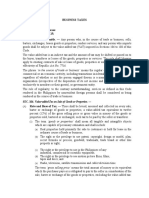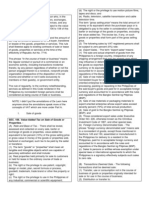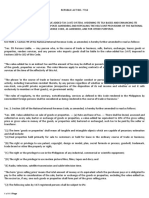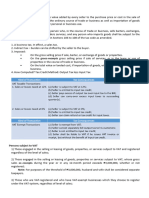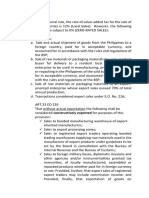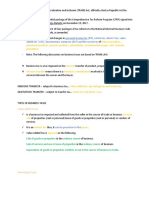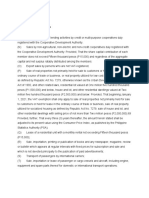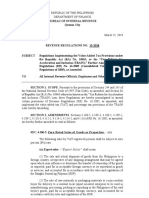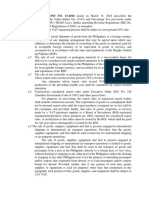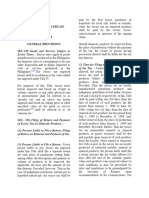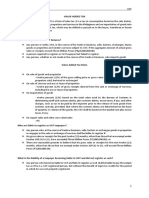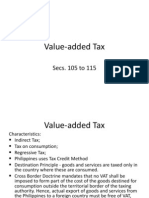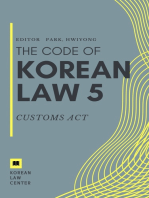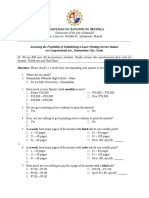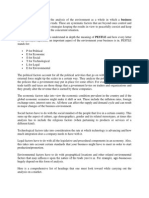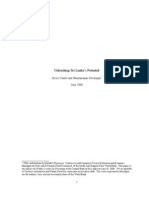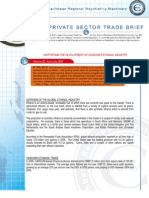0 ratings0% found this document useful (0 votes)
40 viewsTitle Iv Value-Added Tax: Chapter I - Imposition of Tax
Title Iv Value-Added Tax: Chapter I - Imposition of Tax
Uploaded by
NickThis document outlines provisions for a value-added tax (VAT) in the Philippines, including:
1) The VAT is imposed on the sale, barter, or exchange of goods and properties, as well as on the rendering of services and importation of goods, with exemptions for export sales and foreign currency denominated sales.
2) The tax is calculated as 10% of the gross selling price of goods and is paid by the seller, and on imports it is based on import value plus duties and is paid by the importer.
3) The Commissioner of Finance is authorized to determine the appropriate tax base in certain circumstances and for deemed sales.
Copyright:
© All Rights Reserved
Available Formats
Download as DOCX, PDF, TXT or read online from Scribd
Title Iv Value-Added Tax: Chapter I - Imposition of Tax
Title Iv Value-Added Tax: Chapter I - Imposition of Tax
Uploaded by
Nick0 ratings0% found this document useful (0 votes)
40 views3 pagesThis document outlines provisions for a value-added tax (VAT) in the Philippines, including:
1) The VAT is imposed on the sale, barter, or exchange of goods and properties, as well as on the rendering of services and importation of goods, with exemptions for export sales and foreign currency denominated sales.
2) The tax is calculated as 10% of the gross selling price of goods and is paid by the seller, and on imports it is based on import value plus duties and is paid by the importer.
3) The Commissioner of Finance is authorized to determine the appropriate tax base in certain circumstances and for deemed sales.
Original Description:
jkl
Original Title
NIRC
Copyright
© © All Rights Reserved
Available Formats
DOCX, PDF, TXT or read online from Scribd
Share this document
Did you find this document useful?
Is this content inappropriate?
This document outlines provisions for a value-added tax (VAT) in the Philippines, including:
1) The VAT is imposed on the sale, barter, or exchange of goods and properties, as well as on the rendering of services and importation of goods, with exemptions for export sales and foreign currency denominated sales.
2) The tax is calculated as 10% of the gross selling price of goods and is paid by the seller, and on imports it is based on import value plus duties and is paid by the importer.
3) The Commissioner of Finance is authorized to determine the appropriate tax base in certain circumstances and for deemed sales.
Copyright:
© All Rights Reserved
Available Formats
Download as DOCX, PDF, TXT or read online from Scribd
Download as docx, pdf, or txt
0 ratings0% found this document useful (0 votes)
40 views3 pagesTitle Iv Value-Added Tax: Chapter I - Imposition of Tax
Title Iv Value-Added Tax: Chapter I - Imposition of Tax
Uploaded by
NickThis document outlines provisions for a value-added tax (VAT) in the Philippines, including:
1) The VAT is imposed on the sale, barter, or exchange of goods and properties, as well as on the rendering of services and importation of goods, with exemptions for export sales and foreign currency denominated sales.
2) The tax is calculated as 10% of the gross selling price of goods and is paid by the seller, and on imports it is based on import value plus duties and is paid by the importer.
3) The Commissioner of Finance is authorized to determine the appropriate tax base in certain circumstances and for deemed sales.
Copyright:
© All Rights Reserved
Available Formats
Download as DOCX, PDF, TXT or read online from Scribd
Download as docx, pdf, or txt
You are on page 1of 3
TITLE IV VALUE- ADDED TAX
CHAPTER I - IMPOSITION OF TAX
SEC. 105. Persons Liable. - Any person who, in the
course of trade or business, sells barters, exchanges,
leases goods or properties, renders services, and any
person who imports goods shall be subject to the
value-added tax (VAT) imposed in Sections 106 to
108 of this Code.
The value-added tax is an indirect tax and the amount
of tax may be shifted or passed on to the buyer,
transferee or lessee of the goods, properties or
services. This rule shall likewise apply to existing
contracts of sale or lease of goods, properties or
services at the time of the effectivity of Republic Act
No. 7716.
The phrase 'in the course of trade or business'
means the regular conduct or pursuit of a commercial
or an economic activity, including transactions
incidental thereto, by any person regardless of
whether or not the person engaged therein is a
nonstock, nonprofit private organization (irrespective
of the disposition of its net income and whether or not
it sells exclusively to members or their guests), or
government entity.
The rule of regularity, to the contrary notwithstanding,
services as defined in this Code rendered in the
Philippines by nonresident foreign persons shall be
considered as being course of trade or business.
SEC. 106. Value-Added Tax on Sale of Goods or
Properties. (A) Rate and Base of Tax. - There shall be levied,
assessed and collected on every sale, barter or
exchange of goods or properties, value-added tax
equivalent to ten percent (10%) of the gross selling
price or gross value in money of the goods or
properties sold, bartered or exchanged, such tax to
be paid by the seller or transferor.
(b) The right or the privilege to use patent, copyright,
design or model, plan, secret formula or process,
goodwill, trademark, trade brand or other like property
or right;
(c) The right or the privilege to use in the Philippines
of any industrial, commercial or scientific equipment;
(d) The right or the privilege to use motion picture
films, tapes and discs; and
(e) Radio, television, satellite transmission and cable
television time.
The term 'gross selling price' means the total
amount of money or its equivalent which the
purchaser pays or is obligated to pay to the seller in
consideration of the sale, barter or exchange of the
goods or properties, excluding the value-added tax.
The excise tax, if any, on such goods or properties
shall form part of the gross selling price.
(2) The following sales by VAT-registered persons
shall be subject to zero percent (0%) rate:
(a) Export Sales. - The term 'export sales' means:
(1) The sale and actual shipment of goods from the
Philippines to a foreign country, irrespective of any
shipping arrangement that may be agreed upon
which may influence or determine the transfer of
ownership of the goods so exported and paid for in
acceptable foreign currency or its equivalent in goods
or services, and accounted for in accordance with the
rules and regulations of the Bangko Sentral ng
Pilipinas (BSP);
(1) The term 'goods' or 'properties' shall mean all
tangible and intangible objects which are capable of
pecuniary estimation and shall include:
(2) Sale of raw materials or packaging materials to a
nonresident buyer for delivery to a resident local
export-oriented
enterprise
to
be
used
in
manufacturing, processing, packing or repacking in
the Philippines of the said buyer's goods and paid for
in acceptable foreign currency and accounted for in
accordance with the rules and regulations of the
Bangko Sentral ng Pilipinas (BSP);
(a) Real properties held primarily for sale to
customers or held for lease in the ordinary course of
trade or business;
(3) Sale of raw materials or packaging materials to
export-oriented enterprise whose export sales exceed
seventy percent (70%) of total annual production;
(4) Sale of gold to the Bangko Sentral ng Pilipinas
(BSP); and
(5) Those considered export sales under Executive
Order NO. 226, otherwise known as the Omnibus
Investment Code of 1987, and other special laws.
(b) Foreign Currency Denominated Sale. - The
phrase 'foreign currency denominated sale' means
sale to a nonresident of goods, except those
mentioned in Sections 149 and 150, assembled or
manufactured in the Philippines for delivery to a
resident in the Philippines, paid for in acceptable
foreign currency and accounted for in accordance
with the rules and regulations of the Bangko Sentral
ng Pilipinas (BSP).
(c) Sales to persons or entities whose exemption
under special laws or international agreements to
which the Philippines is a signatory effectively
subjects such sales to zero rate.
(B) Transactions Deemed Sale. - The following
transactions shall be deemed sale:
(1) Transfer, use or consumption not in the course of
business of goods or properties originally intended for
sale or for use in the course of business;
(2) Distribution or transfer to:
(a) Shareholders or investors as share in the profits of
the VAT-registered persons; or
(b) Creditors in payment of debt;
(3) Consignment of goods if actual sale is not made
within sixty (60) days following the date such goods
were consigned; and
(4) Retirement from or cessation of business, with
respect to inventories of taxable goods existing as of
such retirement or cessation.
(C) Changes in or Cessation of Status of a VATregistered Person. - The tax imposed in Subsection
(A) of this Section shall also apply to goods disposed
of or existing as of a certain date if under
circumstances to be prescribed in rules and
regulations to be promulgated by the Secretary of
Finance, upon recommendation of the Commissioner,
the status of a person as a VAT-registered person
changes or is terminated.
(D) Determination of the Tax. -
(1) The tax shall be computed by multiplying the total
amount indicated in the invoice by one-eleventh
(1/11).
(2) Sales Returns, Allowances and Sales Discounts. The value of goods or properties sold and
subsequently returned or for which allowances were
granted by a VAT-registered person may be deducted
from the gross sales or receipts for the quarter in
which a refund is made or a credit memorandum or
refund is issued. Sales discount granted and
indicated in the invoice at the time of sale and the
grant of which does not depend upon the happening
of a future event may be excluded from the gross
sales within the same quarter it was given.
(3) Authority of the Commissioner to Determine
the Appropriate Tax Base. - The Commissioner
shall, by rules and regulations prescribed by the
Secretary of Finance, determine the appropriate tax
base in cases where a transaction is deemed a sale,
barter or exchange of goods or properties under
Subsection (B) hereof, or where the gross selling
price is unreasonably lower than the actual market
value.
SEC. 107. Value-Added Tax on Importation of
Goods.
(A) In General. - There shall be levied, assessed and
collected on every importation of goods a valueadded tax equivalent to ten percent (10%) based on
the total value used by the Bureau of Customs in
determining tariff and customs duties plus customs
duties, excise taxes, if any, and other charges, such
tax to be paid by the importer prior to the release of
such goods from customs custody: Provided, That
where the customs duties are determined on the
basis of the quantity or volume of the goods, the
value-added tax shall be based on the landed cost
plus excise taxes, If any.
(B) Transfer of Goods by Tax-exempt Persons. - In
the case of tax-free importation of goods into the
Philippines by persons, entities or agencies exempt
from tax where such goods are subsequently sold,
transferred or exchanged in the Philippines to nonexempt persons or entities, the purchasers,
transferees or recipients shall be considered the
importers thereof, who shall be liable for any internal
revenue tax on such importation. The tax due on such
importation shall constitute a lien on the goods
superior to all charges or liens on the goods,
irrespective of the possessor thereof.
You might also like
- RR 7-95 Consolidated VATDocument64 pagesRR 7-95 Consolidated VATjankriezlNo ratings yet
- Darnton What Is The History of BooksDocument20 pagesDarnton What Is The History of BooksJan Odinoel - OllicadNo ratings yet
- REVENUE REGULATIONS NO. 16-2005 Issued On October 19, 2005 Prescribes TheDocument2 pagesREVENUE REGULATIONS NO. 16-2005 Issued On October 19, 2005 Prescribes TheJennilyn TugelidaNo ratings yet
- RR 16-05Document32 pagesRR 16-05matinikki100% (3)
- HM Revenue & Customs - Form CN23 - 2012Document2 pagesHM Revenue & Customs - Form CN23 - 2012alain_oregioniNo ratings yet
- Strategic Audit For Transportation and Engineering Company For Tires (Trenco)Document16 pagesStrategic Audit For Transportation and Engineering Company For Tires (Trenco)Yousab KaldasNo ratings yet
- Imposition of TaxDocument12 pagesImposition of TaxchriskhoNo ratings yet
- Chapter I - Imposition of Tax: Title Iv Value-Added TaxDocument8 pagesChapter I - Imposition of Tax: Title Iv Value-Added TaxCher TantiadoNo ratings yet
- Value Added TaxDocument11 pagesValue Added TaxYvette Pauline JovenNo ratings yet
- VAT ReviewerDocument72 pagesVAT ReviewerJohn Kenneth AcostaNo ratings yet
- VAT ModuleDocument50 pagesVAT ModuleRovi Anne IgoyNo ratings yet
- B. Taxable TransactionsDocument8 pagesB. Taxable TransactionsJessa Mary Ann CedeñoNo ratings yet
- Title Iv Value-Added Tax Imposition of TaxDocument4 pagesTitle Iv Value-Added Tax Imposition of TaxCat SabioNo ratings yet
- Feb 23 Class VATDocument58 pagesFeb 23 Class VATybun100% (1)
- Value-Added TaxDocument30 pagesValue-Added TaxmeriiNo ratings yet
- Title IvDocument9 pagesTitle IvErica Mae GuzmanNo ratings yet
- Secret Files For TXDocument118 pagesSecret Files For TXGrace EnriquezNo ratings yet
- VAT Codal and RegulationsDocument6 pagesVAT Codal and RegulationsVictor LimNo ratings yet
- VALUE Added TaxDocument20 pagesVALUE Added TaxMadz Rj MangorobongNo ratings yet
- Tax Feb 17Document103 pagesTax Feb 17Lolit CarlosNo ratings yet
- R.A. No. 7716Document11 pagesR.A. No. 7716netortizNo ratings yet
- Value Added Tax - Sale of GoodsDocument8 pagesValue Added Tax - Sale of Goods2071275No ratings yet
- Felipe, Emmyrose N. BSA-3 (Tax 2 MW 8:30-10:00am)Document5 pagesFelipe, Emmyrose N. BSA-3 (Tax 2 MW 8:30-10:00am)AustinNo ratings yet
- Application For VAT Zero RatingDocument9 pagesApplication For VAT Zero RatingHanabishi RekkaNo ratings yet
- Excise Tax AnjDocument4 pagesExcise Tax AnjAngelyn Marie SavilloNo ratings yet
- Revenue Regulations No. 16-2005 (Digest)Document19 pagesRevenue Regulations No. 16-2005 (Digest)JERepaldoNo ratings yet
- Excise Taxes On Certain GoodsDocument4 pagesExcise Taxes On Certain GoodsshakiraNo ratings yet
- Vat On Sale of Goods or PropertiesDocument7 pagesVat On Sale of Goods or Propertiesnohair100% (3)
- Title ViDocument30 pagesTitle Vimiss independentNo ratings yet
- Value Added TaxDocument14 pagesValue Added TaxWyndell AlajenoNo ratings yet
- Value Added Tax 3Document8 pagesValue Added Tax 3Nerish PlazaNo ratings yet
- Business TaxDocument33 pagesBusiness TaxKiro ParafrostNo ratings yet
- RR No. 13-2018 CorrectedDocument20 pagesRR No. 13-2018 CorrectedRap BaguioNo ratings yet
- Joan REPORTING TAX 1Document6 pagesJoan REPORTING TAX 1Jasmin CaoileNo ratings yet
- Value Added TaxDocument13 pagesValue Added TaxRyan AgcaoiliNo ratings yet
- RR 13-2018Document20 pagesRR 13-2018Nikka Bianca Remulla-IcallaNo ratings yet
- Value Added TaxDocument32 pagesValue Added Taxsei1davidNo ratings yet
- Antonio, Gladys C. Bagon, Jaleen Anne A. Lapura, MelgenDocument22 pagesAntonio, Gladys C. Bagon, Jaleen Anne A. Lapura, MelgenJayvee FelipeNo ratings yet
- Export Sale of Goods (Sec. 106 (A) (2) (B) ) : Effectively Zero-Rated SalesDocument13 pagesExport Sale of Goods (Sec. 106 (A) (2) (B) ) : Effectively Zero-Rated SalesTricia Rozl PimentelNo ratings yet
- Value Added TaxDocument13 pagesValue Added TaxKatrina FregillanaNo ratings yet
- VATDocument17 pagesVATnodnel salonNo ratings yet
- Tax Revalida NotesDocument36 pagesTax Revalida NotesRehina DaligdigNo ratings yet
- RR 14-2005-VatDocument68 pagesRR 14-2005-VatEmil A. MolinaNo ratings yet
- Bir RR No. 16-2005-Consolidated Rules On VatDocument50 pagesBir RR No. 16-2005-Consolidated Rules On Vatcrizalde m. de diosNo ratings yet
- Digest RR 13-2018Document9 pagesDigest RR 13-2018Maria Rose Ann BacilloteNo ratings yet
- Value Added TaxDocument4 pagesValue Added TaxJune Romeo ObiasNo ratings yet
- VAT Group 3Document39 pagesVAT Group 3Andrea GranilNo ratings yet
- RR No. 16-05Document71 pagesRR No. 16-05LRBNo ratings yet
- Reviewer - VATDocument8 pagesReviewer - VATMark RanekNo ratings yet
- Input Vat NotesDocument4 pagesInput Vat NotesMary Mia CenizaNo ratings yet
- Excise NotesDocument35 pagesExcise NotesRica BalajadiaNo ratings yet
- PH Tax in A Dot Implementing Rules Regulations Train Law 21mar2018 PDFDocument6 pagesPH Tax in A Dot Implementing Rules Regulations Train Law 21mar2018 PDFWilmar AbriolNo ratings yet
- Tax VatDocument67 pagesTax VatkmabcdeNo ratings yet
- Business TaxesDocument50 pagesBusiness TaxesMacatol KristineNo ratings yet
- Case: Cir V PLDTDocument29 pagesCase: Cir V PLDTJaymee Andomang Os-agNo ratings yet
- Zero-Rated Sales PDFDocument24 pagesZero-Rated Sales PDFNEstandaNo ratings yet
- VatDocument6 pagesVatKenneth Bryan Tegerero TegioNo ratings yet
- Bustax ReviewerDocument7 pagesBustax ReviewerJeremy JimenezNo ratings yet
- Taxation Reviewer VatDocument8 pagesTaxation Reviewer VatDaphne BarceNo ratings yet
- Bar Review Lecture - VATDocument71 pagesBar Review Lecture - VATIsagani DionelaNo ratings yet
- Zero Rated Sales ReportDocument5 pagesZero Rated Sales ReportKorina MarawisNo ratings yet
- Bar Review Companion: Taxation: Anvil Law Books Series, #4From EverandBar Review Companion: Taxation: Anvil Law Books Series, #4No ratings yet
- What Is 'Accounting'Document2 pagesWhat Is 'Accounting'NickNo ratings yet
- University of The City of ManilaDocument3 pagesUniversity of The City of ManilaNickNo ratings yet
- Working Capital ManagementDocument8 pagesWorking Capital ManagementNickNo ratings yet
- Proforma Request LetterDocument1 pageProforma Request LetterNickNo ratings yet
- Chapter 6,7,8Document24 pagesChapter 6,7,8Nick100% (1)
- Gross Estate: Explain The FollowingDocument1 pageGross Estate: Explain The FollowingNickNo ratings yet
- 2Document2 pages2NickNo ratings yet
- Ib 1Document62 pagesIb 1Shaikh SuhailNo ratings yet
- ECO AssignmentDocument8 pagesECO AssignmentachintkaurgandhiNo ratings yet
- Theory Type Questions - For Reference OnlyDocument13 pagesTheory Type Questions - For Reference OnlyHaseeb Ahmed ShaikhNo ratings yet
- Who Can Set Up Sezs? Can Foreign Companies Set Up Sezs?: Basic Difference Between Epzs and SezsDocument7 pagesWho Can Set Up Sezs? Can Foreign Companies Set Up Sezs?: Basic Difference Between Epzs and SezsMohan SubramanianNo ratings yet
- Fareed Zakaria - The Self-Doubting SuperpowerDocument18 pagesFareed Zakaria - The Self-Doubting SuperpowerZallan KhanNo ratings yet
- Guide+to+Importing+and+Exporting +Breaking+Down+the+BarriersDocument77 pagesGuide+to+Importing+and+Exporting +Breaking+Down+the+BarriersGrand-Master-FlashNo ratings yet
- The PESTLE Analysis Is The Analysis of The Environment As A Whole in Which A Business Operates or Tends To Offer Its TradeDocument3 pagesThe PESTLE Analysis Is The Analysis of The Environment As A Whole in Which A Business Operates or Tends To Offer Its TradeFarhana RomanaNo ratings yet
- Hu Dec Like ProductDocument20 pagesHu Dec Like ProductFildza Nabila AviantiNo ratings yet
- International Trade ModuleDocument87 pagesInternational Trade ModuleLeynard ColladoNo ratings yet
- BBA International Business Intro PPT 2Document30 pagesBBA International Business Intro PPT 2sbjafri0No ratings yet
- Supply Chain Management: Strategy, Planning, and Operation: Seventh EditionDocument34 pagesSupply Chain Management: Strategy, Planning, and Operation: Seventh Editionsandeep pradhanNo ratings yet
- Chapter 1: GlobalizationDocument9 pagesChapter 1: GlobalizationSOFIA REBECCA BARROS ALLENNo ratings yet
- Tatad Vs Secretary of Energy DIGESTDocument4 pagesTatad Vs Secretary of Energy DIGESTlingotranslate100% (3)
- Role of Export Promotion Councils in IndiaDocument17 pagesRole of Export Promotion Councils in IndiaSarbeshwar Sahoo100% (1)
- Welcome To Our Presentation!Document170 pagesWelcome To Our Presentation!Tuyết TrinhNo ratings yet
- Paper-II Customs With Answer (21.06.2016) PDFDocument12 pagesPaper-II Customs With Answer (21.06.2016) PDFMoud Khalfani100% (2)
- Administrative Law Cases Chapter 1 PDFDocument14 pagesAdministrative Law Cases Chapter 1 PDFNiel Edar BallezaNo ratings yet
- The Political Economy of International Trade: Mcgraw-Hill/IrwinDocument18 pagesThe Political Economy of International Trade: Mcgraw-Hill/IrwinDuong DoNo ratings yet
- Ghana 2014 Budget StatementDocument223 pagesGhana 2014 Budget Statementpaa kwasi otchereNo ratings yet
- TAX PROJECT - doSAIDOJASOIJDOINASDcxDocument25 pagesTAX PROJECT - doSAIDOJASOIJDOINASDcxadarsh kumarNo ratings yet
- Strategies For Competing in Globalizing MarketsDocument21 pagesStrategies For Competing in Globalizing MarketsDr. J. V. BalasubramanianNo ratings yet
- Tariff Regulation 2014-19 - ICRADocument5 pagesTariff Regulation 2014-19 - ICRAs_banerjeeNo ratings yet
- Ladero BOOK PDFDocument337 pagesLadero BOOK PDFCharles Wesley YapNo ratings yet
- Tui Vs CA (FT)Document8 pagesTui Vs CA (FT)Lemuel Lagasca Razalan IVNo ratings yet
- InfosysDocument10 pagesInfosysDummy vediNo ratings yet
- Unleashing Sri Lanka's Potential: Rocio Castro and Shantayanan Devarajan June 2006Document14 pagesUnleashing Sri Lanka's Potential: Rocio Castro and Shantayanan Devarajan June 2006Dilhani RajapaksheNo ratings yet
- CRNM Trade Brief Volume 15Document6 pagesCRNM Trade Brief Volume 15Office of Trade Negotiations (OTN), CARICOM SecretariatNo ratings yet










